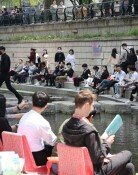Xi needs to face up nuclear storms in North East Asia
Xi needs to face up nuclear storms in North East Asia
Posted September. 10, 2016 07:10,
Updated September. 10, 2016 07:44
After North Korea conducted its fifth nuclear test on Friday, China made a statement. “We strongly urge North Korea to keep its promise to denuclearize, to abide by relevant resolutions from the U.N. Security Council and to stop making any moves that worsen the situation,” China’s foreign ministry said. It was the first time that China urges the North to abide by the U.N. resolution. However, China’s Foreign Ministry spokeswoman Hua Chunying said in a press briefing that China would uphold the six-party talks process to resolve the issue, reconfirming its stance.
Given the lukewarm statement and briefing of China, it is certain that the country will join the efforts to impose sanctions on the North as a permanent member of the U.N. Security Council but the sanctions will not harsh enough to make the North to give up its nuclear desire. When the U.N. adopted resolutions to impose sanctions on North Korea in March, China insisted that the sanctions should be restricted to the issue of nuclear missiles and stressed to conclude the peace treaty between the U.S. and North Korea. The U.N.'s strengthening sanctions can be effective only when China’s determination goes together since the country is the largest trade partner and diplomatic shield of North Korea. It is difficult for the UN sanctions against the North to take effect unless China takes substantial measures to ban imports of coal from the North, cut the oil supply, prevent the transfer of prohibited items by the U.N.
It is estimated that the impact of the UN Security Council's international sanctions and the U.S.-Korea independent sanctions is mere 10 to 20 percent of the North's economic activities. North Korea will never give up its nuclear missiles without overall sanctions that could severely damage its economy.
In China's June report on the execution of the UN Security Council's imposing sanctions against North Korea, it expressed strong objection to the deployment of Terminal High Altitude Area Defense (THAAD) system on the Korean Peninsula. Likewise, it seems that China wants to treat North Korean nuclear issues and THAAD on the equal footing. China sees the anti-missile defense system as part of a broader U.S. strategy to contain the nation, and North Korea is a buffer zone that should be never given up to counter back. If the U.S.-South Korea-Japan defense security cooperation structure is further strengthened, China will try to emphasize geopolitical value of the North.
It is time for China to realize the true nature of the North. Chinese President Xi Jinping changed his stance to recover the relationship with the North starting by meeting Ri Su Yong, the special envoy of the North, on June 1 while the sanctions were carried out. North Korea launched three medium-range missile as the Chinese president re-affirmed his willingness of not accepting North Korea’s nuclear desire during the G-20 summit in Hangzhou. For North Korea, China is not a valuable strategic asset, but a burden.
Before his objection to THAAD deployment on the Korean Peninsula, Chinese President Xi must first resolve North Korean issues, which are threatening the peace and raising tensions in North East Asia. It would be helpful for China to be recognized as the new super power and to pursue China's "One Belt and One Road" policy.
허문명논설위원 angelhuh@donga.com







